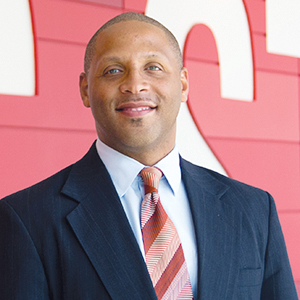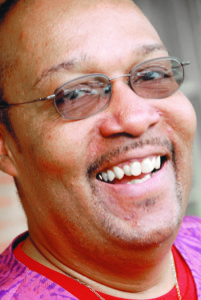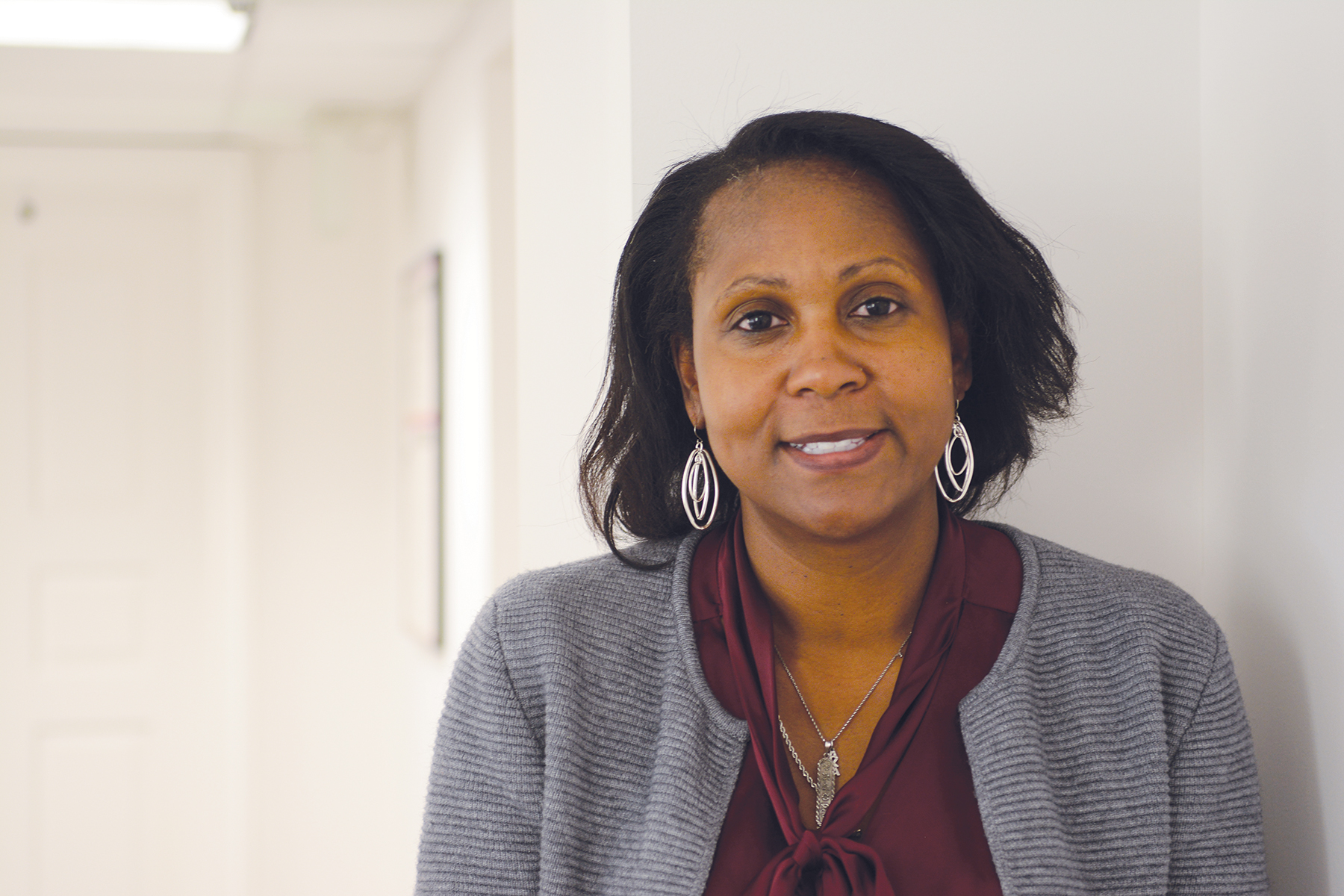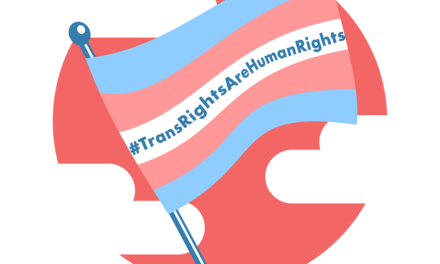Assistant Vice Provost for Student Diversity, Tracey Ray, stands in Winslow Hall on Oct. 19.
Dr. Tracey Ray
Associate Vice Provost for Student Diversity
Interview conducted by Kennysha Woods, Staff Writer
Q: What was the social climate like when you came to campus?
My senior year, that was when [there were] a lot of student demonstrations across campuses. I recall several articles from other campuses and I remember Dr. Rhonda Covington, who at that time was the coordinator of African-American Student Affairs, sharing articles about student activism across the nation. Senior year was a big year too because that’s when the students at [UNC] Chapel Hill had proposed creating an African American Cultural Center and faced some opposition. That’s really what set a lot of things in motion in North Carolina.
A lot of NC State students went down for the event and when the article appeared in the Technician about the event, they described the students at Chapel Hill as “Ku Klux Black,” and that’s really what set off the chain of events that led up to the creation of the Nubian Message. The [African American] cultural center had been around for almost a year at that point, and there were only ten books in the library–it just brought attention to a whole lot of issues to where students said, ‘Okay, it’s time for us to not only pay closer attention but to have conversations with university administration about what we can do on our own campus.’
Q: When the paper first came out, were you involved with it?
I remember the day it was founded. We were in what’s today called the Washington Sankofa Room–the multipurpose room of the [African American Cultural Center] AACC–and we had students from Chapel Hill and [NC] Central. Tony Williamson stood up and said, ‘That’s it. We need our own voice.’ And that’s how the Nubian Message really was created. Literally in that moment. He passed around a sign-up sheet for anybody who wanted to help create this paper. He funded that first paper out of his own pocket. The students at Central and A&T were also part of this activism happening all over North Carolina and the country, and so they said, ‘What can we do to help? We have a press.’ So the first paper–the first year I want to say, at least six months–were printed at Central.
I don’t know if you’ve seen the first edition, but you could tell nobody knew what they were doing. The columns are like three words long, it is the funniest thing to look back on and read, but it also showed the determination. It was like, ‘We don’t know what we’re doing, but we’re going to do this. We’re going to create our own voice.’ I remember not even imagining–just thinking, ‘What is Tony doing? Can we do this?’ and Tony’s like, ‘That’s it, it’s done.’
Tony as a student had so much determination. He was clearly going to be a lawyer or some chief justice–something in that trajectory. He passed away his senior year, and he had so much spirit and determination. The number of people and how they contributed to the Nubian–even though they had those funny columns–it was the content. If you look in the early editions, those are some deep topics and issues explored. There was so much love put into that paper and making sure it was produced, and it really contained Afro-centric perspectives, Afro-centric greatness. Really telling our side of what life was and how to engage in the understanding of the African-American and Afro-centric perspective.
Q: In comparison to back then, do you think the social climate of our campus is different now?
I think history happens in waves and it has this way of repeating itself. So I think today, what we’re seeing is historically what we’ve seen many times over. Students have always been activist movements. They’ve always been involved in protest nationally-speaking and having national conversations around key issues. I think we’re in one of those waves where that is happening and it’s happening at a record rate. In that respect, we’re seeing anything we haven’t seen before, but I think that our Student Media is not in the place it was before… I think news and how it’s reported and the voices that are included have evolved tremendously.
I think we’re in just one of those waves of history and we’ve seen these things before, but some things have changed for the better. Some things have also become more complicated. During my time, we were dealing with campus issues, but I think now you all are dealing with national issues. You’re thinking about how it impacts your campus, but you’re also thinking about how it impacts your nation. That’s a little different that what we were dealing with in the early 90’s.
Q: Do you think the Nubian Message is still important for campus today? Why?
Absolutely. I think it gives a space to be creative. I think that until the lion has its own historian to tell its story, the hunt will always glorify the hunter. It provides an important mouthpiece around Afro-centric perspectives. When I used to work as director of Multicultural Student Affairs, fifty percent of our African-American students came from predominantly black high schools, and so when you talk about transition and the need to create community, that becomes important even more for those students. I think the Nubian is one way to quickly establish that sense of community for students and serves as a place and space. I’ve seen Nubian do a lot of big things on campus in terms of reporting. I’ve seen it bring together faculty voices. I’ve also seen it welcome new members of our community in very functional and creative ways that only the Nubian can do.
Q: What is your fondest memory of the Nubian?
So maybe around 2001, the university libraries worked to archive every edition of the Nubian and they were missing some. I had all of them. Literally. So I added to their collection and they microfiched them to make sure they had them all.
I keep a lot of Nubians. I can’t say I have a favorite because how can I not love every one? Maybe this illustrates my dedication to Nubian. When I started collecting them, I don’t think I was collecting for the purpose of archiving them. Maybe something in me knew that they would be important someday. I’ve always collected them because they were important to me. I’ve been on this campus 28 years and just to see the student thought and scholarship, and like I said, there are so many important historical moments in these papers that are reported in a way that only the Nubian can capture them. I think they’ve all been important to me. Some issues are more fun than others, but I’m not sure I can say there’s one I love most.
[On Nubian Message Founder Tony Williamson]
Every time I talk about Tony I want to cry because I love him to death, I love what he did as a student, I love his vision. For me, I think the Nubian is how Tony still lives. He did something that I don’t think any of us had imagined would last this long and none of us imagined this world without him, but I think that was his legacy and is his legacy. For me, it’s a way to honor his memory.

Reggie Barnes
Senior Director of Campus Community Centers
Interview conducted by Shawn Fredericks, Staff Writer
Q: How was the campus climate leading up to the creation of the Nubian?
It’s was a continuation of angst and anxiety towards things published in the Technician. Being an athlete, I was disconnected from most of the protests, although I participated in the march towards WKNC. Getting the Nubian established was really huge. It was giving an African-American perspective on campus. The Technician would talk about something, but the Nubian would give a whole other perspective. At first, we did not realize the magnitude of the Nubian. We knew it was good to have a black newspaper, but it didn’t fully register until now, being in my position at NC State and looking at the history of NC State.
Q: What does the Nubian do for the Black community?
There is a quote Mama Thorpe used to say: “Until the lion tells his side of the story, the tale of the hunt will always glorify the hunter.” It gives us an opportunity to tell our story instead of relying on the narrative given to us by the Technician. The Nubian gave us much more of a voice.
Q: Is there still a need for the Nubian even with all the diversity and inclusion initiatives?
Yes, definitely. The perspective of the African-American community will always be important, and the Nubian will always be a vehicle to tell that story.
Never be afraid to tell the truth. I think the truth is discouraged if it makes people uncomfortable. I think in order to honor the legacy of Dr. Witherspoon, Dr. Moses and Dr. Clark and a host of other people, they were not afraid to tell the truth. I am in position where I have to be mindful of how the truth is presented. As an administrator, I can appreciate the Nubian being transparent and expecting transparency from the university.
Q: What does having the Nubian Message mean to you?
When I came back to NC State, the first thing I looked for was the Nubian Message. When I found it, I really felt like I was at home again. A lot of things changed, but knowing that the Nubian was still here meant a whole lot to me.

Dr. Craig Brookins
Director of interdisciplinary Studies Major, Associate Professor of Psychology & Africana Studies
Interview conducted by Kennysha Woods, Staff Writer
Q: When did you start working at NC State? How would you describe the social climate on campus when you first arrived?
I started at NC State in 1990. My experience of the social climate was more connected to faculty and staff. We had a fairly strong and active network of African-American colleagues who were deliberate in their focus on improving the climate and opportunities for faculty, staff, and students. African-American faculty were also more involved with the African American Cultural Center as members of the advisory board and, to some degree, participating in programs. The numbers of African-American faculty have been stagnant since then and many of those who were more involved left the university.
Q: Were you ever involved with the Nubian Message?
I have always tried to be an active supporter of the Nubian Message as a reader, distributor to my colleagues, and submitter of essays and opinion pieces. I am a firm believer in promoting the voice of students, and the Nubian Message, although stronger in some years than others, has always been an important contributor to highlighting and providing insight on issues of relevance to African-American students and others on campus.
Q: In comparison to the past, do you think the social climate of our campus is different now?
I think the social climate in terms of relations across racial, gender, ethnic and other categories has fluctuated considerably over the years and this is often consistent with the broader climate we see in the country and world.





